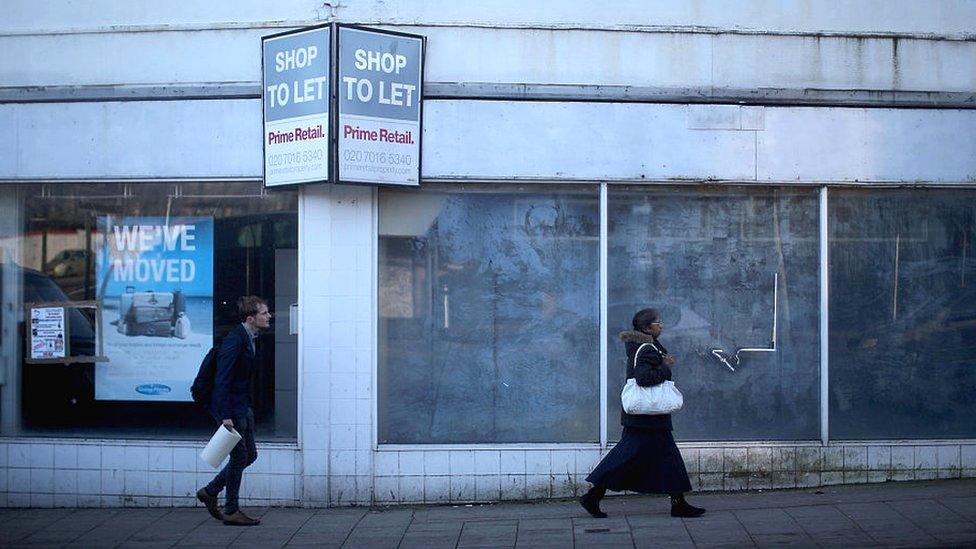Shop local - and set the tax rates there too?
- Published

The election result has put the focus on the need to think more local in a response to the places that feel like they have been left behind.
An opportunity has arisen with an amendment to the business rates bill, which would shift control of non-domestic rates from Holyrood to councils.
While the SNP administration may struggle to overturn the move, business lobby groups are mobilised on the government's side.
People in the final throes of Christmas shopping are facing the familiar call to support their local high street.
As big national chains shrink their retail footprint, small independent firms are taking up the space, trying to provide something distinctive and to give town centres more of a sense of place.
Going local has become all the more topical after a general election in which England's towns asserted themselves.
It was the towns that were key to the Brexit majority, and towns that have sent Labour packing. The constituencies remaining Labour red are heavily skewed to cities.
The interpretation of this in some quarters is that towns and their high streets feel left behind. So is this time to reassert themselves?
It happens that they may be about to get an opportunity in Scotland, with a looming battle over control of nearly £3bn of tax revenue each year.
On manoeuvres
This is about Non-Domestic Rates, or business rates. Not, admittedly, the most scintillating subject, least of all for the festive season, but stick with this - it could blow up into something big next month and it has far-reaching implications.
A bill is before Holyrood, and has been for most of this year. At its second stage, in committee, Green MSP Andy Wightman, lodged several amendments, one of which passed.
To the alarm of the business lobbies, this change hands the power to set business rates from the Scottish government to local authorities.
Hence, we could get 32 different business rates, some inflated to plug budget gaps, others used to undercut neighbouring areas.
Mr Wightman's view is that local control existed until 1992, and it would be good for local accountability if it returned to that position.
He cites the example of Highland Regional Council, which used to use its flexibility on business rates to help the fabrication yards at Nigg and Ardersier through peaks and troughs of work.

Wresting the power to set business rates from central government is favoured by local authorities but the move is facing resistance amid fears it could result in wide variations of the tax across Scotland
It's no surprise to the St Andrew's House administration that Mr Wightman is on manoeuvres. He's a formidable operator, with a deep understanding of land law.
What seems to have surprised it was the support of Labour and Conservative committee members.
The Scottish government is very keen to overturn the amendment at the final stage of legislating next year.
A spokeswoman said: "The amendment creates huge uncertainties and unintended consequences for both ratepayers and Scottish councils. As it stands, it also abolishes vital business rates relief from tens of thousands of businesses."
But lacking a parliamentary majority, it is not clear the SNP can overturn the amendment.
Fears and complexity
Business lobby groups, meanwhile, are deeply perplexed. They have responded forcefully.
The recurring concern is that the Small Business Bonus Scheme, which exempts premises with low rates valuations, would come to an end.
According to the Scottish Fiscal Commission (SFC), external, which has run the numbers on this since the committee vote, that move alone would raise (thus costing business) another £355m.
That assumes that the poundage rate (the amount charged per pound of valuation) is not changed by councils.
The SFC also looks at the Large Business Supplement. If that is no longer a levy the Scottish government can apply, it reduces revenue by £128m, says the SFC.

The Small Business Bonus Scheme was introduced in 2008 and has saved qualifying firms well in excess of £1bn since.
Andy Wightman has an answer to the concern about national reliefs being removed, including the Small Business Bonus Scheme.
He tells me that the removal of the power for the Scottish government to offer such reliefs is a drafting error. He will propose the removal of that part of the amendment at stage three of the Bill.
Let's see if that reassurance calms the chorus of criticism, and helps Tory MSPs to support a revised Wightman amendment.
Welcome in some quarters
One lobby group that likes the look of the Wightman amendment is the council umbrella group Cosla, which said the move is "a welcome opportunity to progress towards greater fiscal empowerment".
However, the councils don't want this power without preparatory work, to look at any implications. It wants to see that done "at pace", while recognising it won't be ready before stage three.
Business rates also featured in the Queen's Speech at Westminster. This unloved system of taxation, failing to address the fundamental changes to the economy through digital commerce, is due for another review down south.
That need not affect Scotland, but it probably will. The Scottish Parliament has, since 1999, had powers to do whatever it wishes with business rates.
A change is going to come
Yet for all the talk about needing the levers of tax power to grow the economy faster, Labour, Lib Dem and SNP administrations have only tinkered at the margins, with reliefs for some and supplements for others. The poundage charged on each pounds-worth of rateable valuation has been pegged to whatever Westminster sets.
So if Westminster reforms the English system, Scotland may no longer have a lead it can follow - not unless Holyrood adapts its own reforms.
In general, business would very much like to see big changes to the system, going much further than the Scottish government current legislation. But preferably not Andy Wightman's grand plan.
